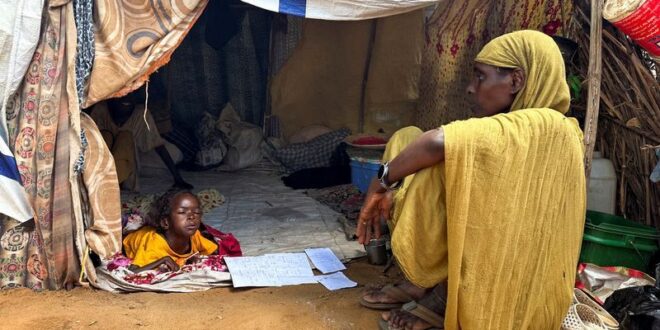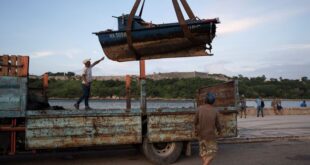(Reuters) – Medical charity MSF says it has been forced to suspend work in the vast camp for displaced people where famine has been confirmed in Sudan’s North Darfur region, putting thousands of malnourished children at risk of death.
MSF said it had to halt activities in Zamzam camp following the obstruction of aid around nearby al-Fashir by the paramilitary Rapid Support Forces (RSF), which has been besieging the city for months, as well as the Sudanese army’s systematic blocking of aid to areas outside its control.
The army and the RSF have been locked in conflict for nearly 18 months, triggering a profound humanitarian crisis in which more than 10 million people have been driven from their homes and U.N. agencies have struggled to deliver relief.
“Because of the supply blockades MSF has been forced to stop supporting Zamzam camp and leave 5,000 children who are malnourished, including 2,900 children who are severely malnourished, without support,” MSF’s Claire San Filippo told a briefing on Friday.
“It is heartbreaking to have to suspend our activities,” she said.
The RSF released a video on Friday in which it said it was ensuring safe passage for civilians in al-Fashir and providing supplies to displaced people. The army has previously denied impeding humanitarian aid.
U.S.-led talks in Switzerland in August produced pledges from both the warring parties to improve access for aid. But fewer than 200 trucks of aid have entered Darfur from Chad through a key crossing since mid-August, while the 450,000 people living in Zamzam alone need 100 trucks of food aid per month, according to MSF.
San Filippo also said staff working with a severe shortage of supplies at a hospital MSF supports in Sudan’s capital, Khartoum, had seen a dramatic increase of violent trauma cases arriving after a recent escalation of fighting, as well as very high malnutrition rates.
Medical staff were being insulted, harassed and assaulted as they worked, she added.
A globally recognised hunger monitor confirmed in August that famine was occurring in Zamzam and that there was a risk of famine in 13 other sites across Sudan.
“We are really concerned that thousands of children are going to be left to die if nothing is done,” San Filippo said, calling on the United Nations and international community to act.
“There is a need for a massive, urgent scale-up right now. The people in Sudan can simply not wait.”
(Reporting by Aidan Lewis; editing by Philippa Fletcher)
 BeritaKini.biz Berita Viral Terkini di Malaysia
BeritaKini.biz Berita Viral Terkini di Malaysia





